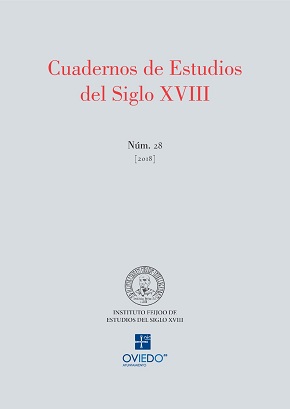Resumen
RESUMEN
En "The Enlightenment: History of an Idea" el historiador italiano Vincenzo Ferrone reivindica lo que llama el nuevo humanismo del siglo XVIII, componente significativo, en su opinión, de la mentalidad ilustrada. Este trabajo considera el humanismo español dieciochesco dentro de una mentalidad ilustrada, partiendo del principio fundamental de la dignidad e importancia de cada ser humano. Explora el significado de la palabra ‘humanidad’ en los textos de varios autores —Foronda, Jovellanos, Meléndez Valdés, "El Censor" y otros— en que aluden a comportamientos humanistas, y a continuación subraya el empleo de la palabra humanidad en "El delincuente honrado" de Jovellanos, drama que cuestiona el sistema judicial español del siglo XVIII. Finalmente analiza la comedia de Comella "Federico segundo en Glatz o la humanidad" en que el dramaturgo presenta aspectos del sistema judicial de Prusia, examinando la práctica de la tortura y su abolición por el rey.
PALABRAS CLAVE
Ilustración, humanismo, Jovellanos, Comella, sistema judicial, tortura.
TITLE
Enlightenment and the new humanism in eighteenth-century Spain
ABSTRACT
In "The Enlightenment: History of an Idea" the cultural historian Vincenzo Ferrone identifies humanism as a major component of Enlightenment thought. The present study focuses on characteristics of this new humanism in eighteenth-century Spanish discourse. Its starting point is the principle of humanism which affirms the dignity of human behaviour, seeing it as a motivating and guiding force in society. It explores the significance of the word ‘humanity’ in texts of various authors —Foronda, Jovellanos, Meléndez Valdés, "El Censor" and others— who consider it a necessary human virtue. This leads to a brief examination of the word ‘humanidad’ in "El delincuente honrado" by Jovellanos, a play which questions the Spanish judicial system. Finally, there is a more detailed analysis of Comella’s sentimental drama "Federico segundo en Glatz o la humanidad", in which the dramatist highlights aspects of the Prussian prison system and condemns the practice of torture prior to its abolition.
KEY WORDS
Enlightenment, humanism, Jovellanos, Comella, legal system, torture.

